“Let them eat cake!” said Daniel D. Moore at the end of the spring 2015 semester. It was the night he presented three student members with Legatus Christi certificates. Moore is the Ratio Christi chapter director at Western Michigan State University (WMU). We did a previous feature on the chapter when Moore anticipated an active season in bringing Christ to campus.
Moore introduces us to the WMU students whom he surprised with our outstanding achievement acknowledgment.
“Joel Ballivian, Kari Zigterman and Zach Kuhl voluntarily participated in additional training and discipleship over the past year in the areas of Servant Leadership, Christian Character, and Apologetic Theology. We are confident that Joel, Kari and Zach will continue to serve the church with their knowledge and skills while representing our Savior to the whole world. The honor is not recognition of an accomplishment, but instead the commencement of a new path in their Christian walks. Congratulations to these graduates and former leaders on receiving the designation of Legatus Christi – which is Latin for ‘Ambassador of Christ’.”
Already busy in her new career, Zigterman sent us a summary about her time with Ratio Christi and how apologetics was an unexpected venture for her:
“Apologetics is not an area that I was interested in – it is something that I mostly fell into. I started by going to a discussion group with friends, watching videos such as The Case for Christ by Lee Strobel and debates like one between atheist Richard Dawkins and John Lennox (philosopher, scientist and Christian apologist). After each video we would talk about it and how to talk to people about the things that were brought up within the films.
I had always had an interest in theology and talking about different views of the interpretation of the scriptures. But I did not realize that I was actually doing ‘apologetics.’ I met a friend through this group who eventually went on to become the assistant director of Ratio Christi at Western Michigan University.
The first year RC was started, he asked me if I wanted to be involved. My original thought was that I’m not a philosophy major, so how can I be part of this group? I was also a second career student so I thought I would not have the time. Ultimately, I decided I wanted to be part of Ratio Christi. I have learned a lot about how to be an apologist without being a philosopher. I began to attend the weekly meetings and ended up really liking it. The second year of our chapter at WMU I knew that I wanted to become more involved, and I was able to serve as the student vice president for the 2014-2015 school year.
The certificate of Legatus Christi means quite a bit to me. Mostly because it is what I think we should all strive to do – to teach others about the truths of the Bible and Christ without trying to win an argument with them. It means I have been trained to go out into my current job and show people Christ, and to have intelligent conversations about Christianity and the Bible with people who do not believe.
Since graduating, I accepted a job with a healthcare company. We are contracted with the hospitals to work in open heart surgery, spinal surgery, orthopedic surgery, and general surgery as well as administer continuous dialysis in the hospital. I will be using the skills that I developed with Ratio Christi and Legatus Christi in my job to be a light and to have intellectual conversations about Christianity.”
Ballivian and Kuhl weigh in with their experience
We then had a chance to do a Q&A session with Ballivian, the chapter’s president for 2014-15, and Kuhl who was secretary-treasurer.
Q: Joel, when did you accept Christ as your Savior?
Ballivian: I made a serious commitment to Christianity when I was about 14 years
old, while at a youth group event. I think the discipleship I received through my high school youth group focused mainly on orthopraxy (i.e., right actions), missions, and being a witness for Christ through one’s lifestyle and decisions. Later in my life, I started to engage seriously with the rationality behind my faith.
Q: How about you, Zach?
Kuhl: I feel I have always accepted Christ, though I become more involved in my faith when I entered college.
Q: How did you each become interested in apologetics, and then how did you find Ratio Christi?
Ballivian: My interest in apologetics blossomed as the result of a season of doubt and agnosticism concerning my faith. After serving with an international missions movement for a year after high school, I became seriously involved in youth ministry at my church. For different reasons, however, seeds of doubt concerning the truth of Christianity began to take root in my
mind. For the first time in my life, I seriously wondered whether my Christian convictions were true. I fought desperately to maintain my beliefs but was unable to resolve my intellectual concerns.
I eventually found myself moving in and out of agnosticism. Although I didn’t know it at the time, many of my intellectual hang-ups were related to debates in the philosophy of religion (e.g., divine hiddenness, religious experience, religious epistemology, etc.). In addition, I had questions about the reliability of scripture. During this prolonged season of doubt I realized I needed to invest myself more intentionally in investigating the rational merits of theism and Christianity, as well as my misgivings of both. So I started looking up books and podcasts on the internet, finding material relevant to my questions. As I tapped into literature from apologetics and the philosophy of religion, my faith steadily found stronger footing.
It had always seemed to me like Christianity had the potential to satisfy the longings of human hearts; it was only a matter of time before I also gained confidence about its ability to satisfy the questions of our minds.
This conviction has continued to grow and be refined, inspiring me to get involved in Ratio Christi at Western where I now study philosophy. RC afforded me an opportunity to encourage others to think about their beliefs, while also providing an environment where I could continue to grow in my own understanding of Christianity. I feel very honored to receive the Legatus Christi.
Kuhl: I became interested in apologetics mostly just by looking up information on the internet about ways to defend the Christian faith. Not long after I started, I heard about RC through a friend who attended, with whom I was in a Bible study.
I also felt honored to be included in the Legatus Christi recognition, and I’m thankful to all the people who helped me throughout my few years at RC. Daniel and Jon (Meyer, assistant director) helped us by giving support when needed along with answering questions from us or other people in the chapter. I’d also like to thank Jesus, my parents, Joel, Kari, and everyone else in RC at WMU.
Q: How do you think apologetics has enriched your life, your own faith and your witness to others?
Ballivian: Apologetics was my introduction to critical thinking and philosophy, as well as to more precise and robust arguments for and against the Christian. All of these things are immensely valuable. For example, having the opportunity to understand and apply methodologies for examining claims of truth. It develops the skills every serious truth seeker
should possess. For me, apologetics got the ball rolling in learning about these methods and their proper use.
Doing good apologetics will inevitably lead a person to wrestle with the best arguments against one’s own position. This is personally enriching. It gives the opportunity to really reflect on the merits of the position, while also allowing one to avoid confirmation bias — the tendency to seek and examine evidence that only supports what one already believes.
Kuhl: Apologetics has allowed me to have better dialogue with non-Christians or with Christians who have doubts. It also helped me to grow closer to Christ and grow in a deeper relationship with Him.
It’s important for young Christians and Christians in general to get involved in apologetics. The secular culture in which we live attacks the Christian lifestyle, especially in college where many Christians are not prepared for their faith to be assaulted on all sides. Apologetics must be used with love, and always used to build bridges between people.
Q: What’s next for each of you?
Ballivian: My (undergraduate) major was philosophy with a minor in comparative religions. I’m now on my way to complete an M.A. in philosophy at WMU. Whether I’ll be available to help out at RC or not while in grad school isn’t clear.
Kuhl: I graduated in May with a major in creative writing and minor in comparative religions. I’ll still try to attend RC in the fall. I hope to work in the publishing industry and to get the few novels I’m working on published. Hopefully in the long term I’ll be able to work at a ministry of some sort.
Kuhl concludes, “And yes, the cake was good!”
Posted on Nov 2, 2015 by Sheryl Young. Content in blogs does not necessarily represent Ratio Christi’s views.


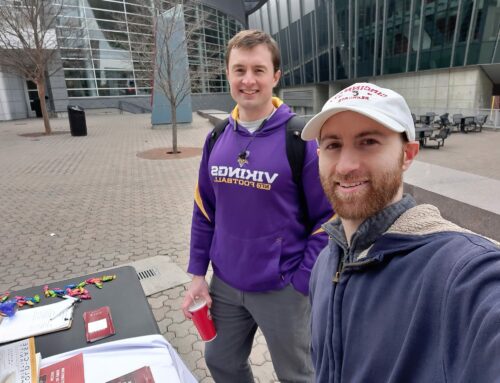
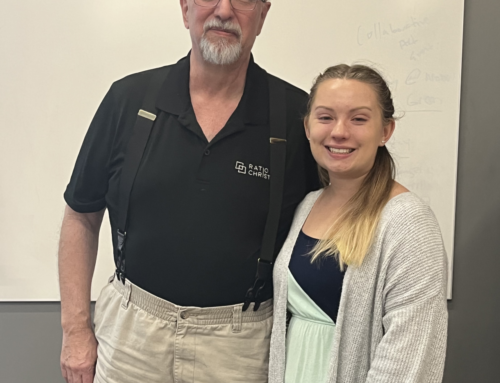
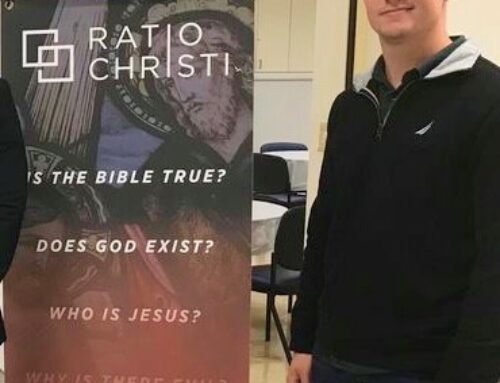
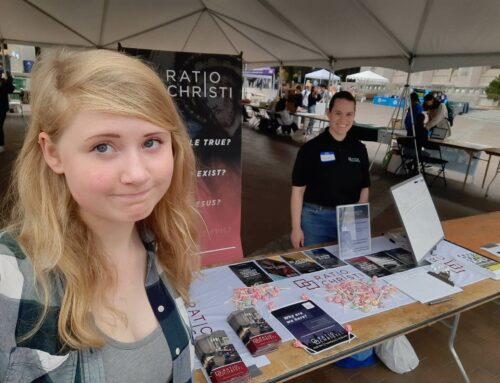

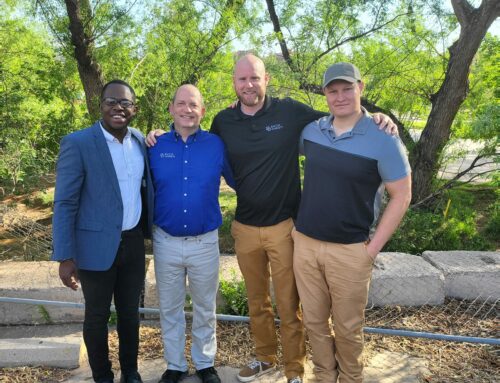
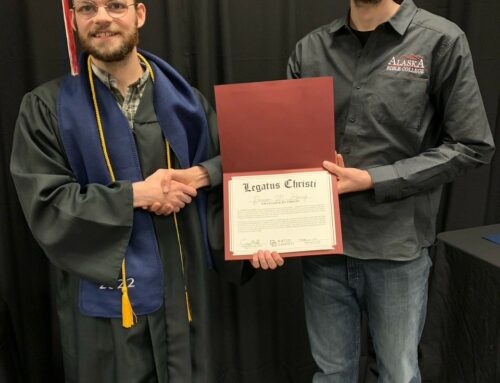

Leave A Comment